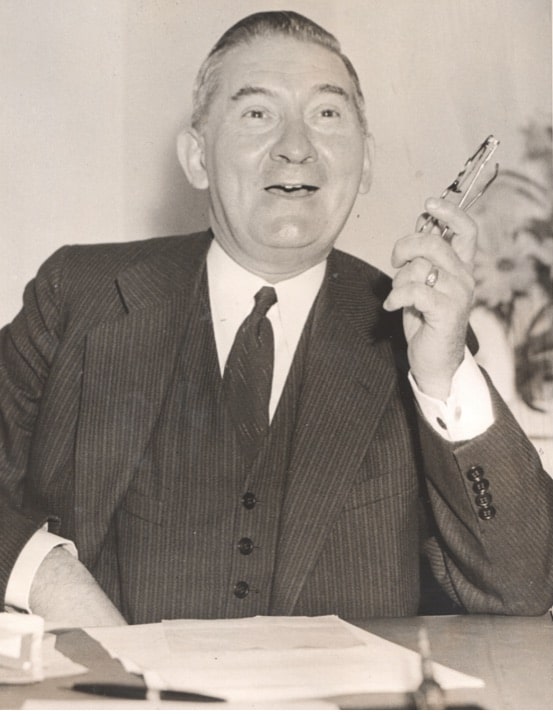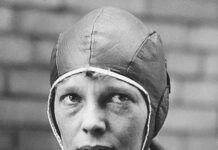
By Mary Hoar, President Untermyer Performing Arts Council, President Emerita of the Yonkers Historical Society
Monday, September 28th
September 28, 1891: John Copcutt filed lawsuits against the City of Yonkers and Alexander Smith & Sons’ Carpet Company for fouling the Nepperhan River, and affecting his usage of river water. Mr. Copcutt purchased a tract of land that included the lower waterfalls where the Nepperhan River emptied into the Hudson and erected several substantial factories. Copcutt (1805-1895), a prominent industrialist, contributed significantly to the development of Yonkers, not only by building his factories, but also by building cottages for his workers to rent.
September 28, 1940: Empire City Raceway prepared for 100,000 people to attend a Republican State Convention rally for Presidential candidate Wendell Wilkie. They provided 28,000 reserved seats, with additional seating placed on the lawn. Members of the Young Women’s Republican Club of Westchester assisted, acting as uniformed Wilkiettes; the State Republican Convention that year was held at the Westchester County Center.
Tuesday, September 29th
September 29, 1918: Yonkers rang with the sound of factory whistles, church bells, the Liberty Band and the sounds of thousands of Yonkers residents to open the Fourth Liberty Loan drive. The official kick off was held at the Liberty Theater, where Mayor William Wallin introduced its official slogan, “All Yonkers. Carry on.”
September 29, 1949: Seaman apprentice Steve Donatone of Willow Street took part in an amphibious landing at Carson Beach in the Boston area. More than 3,000 Navy and Marine Corps personnel, commanded by Naval Captain Richard Phillips, took place in conjunction with the National Marine Corps League convention. Eleven ships, jet fighter planes and helicopters from the Squantum Naval Air Station, and the Second Marine Division participated; Donotone was on the LS 1041.
Wednesday, September 30th
September 30, 1927: After a much long and heated discussion, twenty-three Yonkers school principals voted to turn down Superintendent Lamont Hodges’ suggestion to establish uniform schools hours in all schools. The principals contended that a ninety-minute lunch was necessary for schools in the outlying area with students who lived a distance from the school.
September 30, 1936: Yonkers resident Judge William Bleakley was selected as the Republican candidate for New York Governor at the state convention in Albany.
Thursday, October 1st
October 1, 1941: US Coast Guard Third-Class Petty Officer Frederick Dormer of 1 Lawrence Street, received a bronze medal for the Life Saving Benevolent Association of New York from rescuing a man in Upper New York Bay. While on duty on the US CG Cutter Manhattan moored at Battery Park, Dormer saw a man fall or jump into the bay. He immediately ran to the seawall from which the man leaped, took off his shoes, and jumped in after him. After struggling with the drowning man, Dormer managed to get a rope around him and pulled him to the dock. Dormer then swam back to his ship.
October 1, 1942: Just five weeks after the Yonkers Common Council voted to suspend City Manager Raymond Whitney, they unanimously voted to dismiss the charges against him and immediately reinstate him. He had been charged with failing to suppress gambling in Yonkers; Governor Lehman had ordered gambling suppressed in Yonkers after receiving complaints professional gamblers were operating in our fair city. The Council had indicated they would fire Whitney at the end of the 30-day suspension. Instead, after Whitney’s attorney Sheldon Pollock informed the Council his client intended to “defend himself to the utmost against charges reflecting on his honesty, reputation and ability,” the Council dropped the charges. Those who had voted to suspend him—Curtis Frank, Edith Welty, and Thomas Sullivan—and James Sullivan who had supported him, voted shortly after Pollock’s impassioned speech. Whitney made no comment. The Council members reversed their position without explanation; scuttlebutt had it that the Council agreed to drop the charges to enable Whitney to resign without jeopardizing his ability to take another job.
Friday, October 2nd
October 2, 1953: A Russian born Yonkers woman met her brother for the first time! Mrs. Irving Goodman of St. John’s Avenue had left Russia two years before her 45-year old brother Manuel Brytwa was born. Brytwa had escaped Russia when Hitler invaded Russia, stowing away on a tramp steamer to Buenos Aires; all other family members were killed in concentration camps.
October 2, 1969: First Westchester County Executive William Bleakley passed away. After receiving his law degree from Cornell, he practiced law in Yonkers for nine years and served as a trustee on the Yonkers School Board.
He was elected to the Yonkers City Court in 1917 and in 1922 elected Westchester County Judge, endorsed by both major parties; this was the first time a judge ran with dual endorsement in Westchester. He was elected to the NYS Supreme Court in 1928. Bleakley ran unsuccessfully for governor in 1936 but was elected Westchester’s first County Executive two years later. He resigned as County Executive in 1941 to accept an appointment from his former opponent Governor Lehman to the Moreland Act Commission to investigate Workmen’s Compensation violations.
Saturday, October 3rd
October 3, 1931: Former Notre Dame Football Captain John Law took over as coach of the Manhattan College Football Team. Law captained the undefeated 1929 National Championship Notre Dame team, coached by Knute Rockne. Rockne considered his 1929 team to be the “strongest” team of all he coached.
October 3, 1933: Captain Arthur, head of the Vineyard Avenue Firehouse, received the Order of the Purple Heart for wounds he received in 1918 while fighting with the 27th Division of the A. E. F. in France.
Sunday, October 4th
October 4, 1929: The Yonkers Statesman put up a magnetic player board on the lower part of Main Street. This board allowed thousands of Yonkers baseball fans to see a play by play account of the World Series between the Athletics and Cubs.
October 4, 1943: Yonkers was abuzz because First Lady Eleanor Roosevelt mentioned Yonkers in her column, “My Day.” While speaking about her trip to the South Pacific, she mentioned sitting with a “youngster from Yonkers,” who attended Colgate. She was charmed when he mentioned he often passed through Hyde Park when traveling back to school. Unfortunately, she did not say who the student was!
For more information on the Yonkers Historical Society, visit our Facebook page at www.facebook.com/YonkersHistoricalSociety, or call 914-961-8940.





